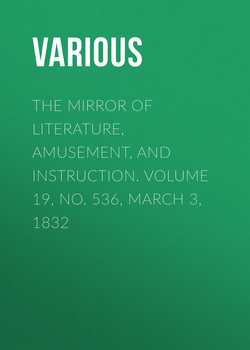Читать книгу The Mirror of Literature, Amusement, and Instruction. Volume 19, No. 536, March 3, 1832 - Various - Страница 4
SCOTTISH ECONOMY
ОглавлениеSHAVINGS v. COAL AND PEAT
(To the Editor.)
Without intending to be angry, permit me to inform your well-meaning correspondent, M.L.B. that his observations on the inhabitants of "Auld Reekie," are something like the subject of his communication "Shavings," rather superficial.
Improvidence forms no feature in the Scottish character; but your flying tourist charges "the gude folk o' Embro'" with monstrous extravagance in making bonfires of their carpenters' chips; and proceeds to reflect in the true spirit of civilization how much better it would have been if the builders' chips had been used in lighting household fires, to the obviously great saving of bundle-wood, than to have thus wantonly forced them to waste their gases on the desert air. But your traveller forgot that in countries which abound in wheat, rye is seldom eaten; and that on the same principle, in Scotland, where coal and peat are abundant, the "natives," like the ancient Vestals, never allow their fires to go out, but keep them burning through the whole night. The business of the "gude man" is, immediately before going to bed, to load the fire with coals, and crown the supply with a "canny passack o' turf," which keeps the whole in a state of gentle combustion; when, in the morning a sturdy thrust from the poker, produces an instantaneous blaze. But, unfortunately, should any untoward "o'er-night clishmaclaver" occasion the neglect of this duty, and the fire be left, like envy, to feed upon its own vitals, a remedy is at hand in the shape of a pan "o' live coals" from some more provident neighbour, resident in an upper or lower "flat;" and thus without bundle-wood or "shavings," is the mischief cured.
I hope that this explanation will sufficiently vindicate my Scottish friends from M.L.B.'s aspersion. Scotchmen improvident! never: for workhouses are as scarce among them as bundle-wood, or intelligent travellers. Recollect that I am not in a passion; but this I will say, though the gorge choke me, that M.L.B. strongly reminds me of the French princess, who when she heard of some manufacturers dying in the provinces of starvation, said, "Poor fools! die of starvation—if I were them I would eat bread and cheese first."
The next time M.L.B. visits Scotland, let him ask the first peasant he meets how to keep eggs fresh for years; and he will answer rub a little oil or butter over them, within a day or two after laying, and they will keep any length of time, perfectly fresh. This discovery, which was made in France by the great Reamur, depends for its success upon the oil filling up the pores of the egg-shell, and thereby cutting off the perspiration between the fluids of the egg and the atmosphere, which is a necessary agent in putrefaction. The preservation of eggs in this manner, has long been practised in all "braid Scotland;" but it is not so much as known in our own boasted land of stale eggs and bundle-wood.
In Edinburgh, I mean the Scottish and not the Irish capital, M.L.B. may actually eat new laid eggs a year old! How is it that this great comfort is not practised in the navy? The Scotch have also a hundred other domestic practices for the saving of the hard earned "siller;" and are far from the commission of any such idle waste as M.L.B.'s story exhibits. S.S.
P.S. Tinder-boxes are unknown in Scotland, and I am sure M.L.B. if he wants a business would as readily make his fortune by selling them, as the Yorkshireman who went to the West Indies with a cargo of great coats.
